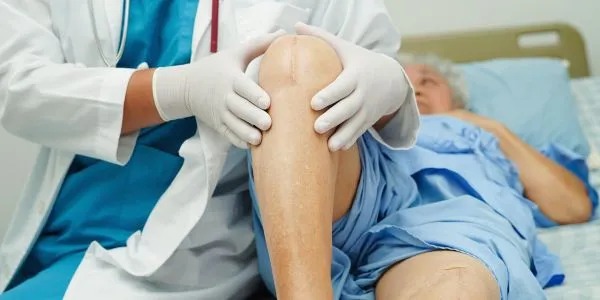Understanding Knee Replacement Surgery
Knee replacement surgery replaces damaged joint surfaces with artificial parts, often to relieve severe arthritis or injury-related pain and stiffness.

There are several types of knee replacement surgeries:
- Total Knee Replacement (TKR) replaces the entire knee joint with artificial parts.
- Partial Knee Replacement replaces only the damaged part, keeping healthy tissue intact.
- Minimally Invasive Knee Replacement: Smaller incisions mean less tissue damage and quicker recovery.
- Revision Knee Replacement: A revision knee replacement replaces a worn or problematic artificial knee joint.
The procedure choice depends on age, health, knee damage, and lifestyle. Skilled Indian surgeons ensure high success rates.
Knee Replacement Surgery Success Rate in India: Statistics and Trends
India’s knee replacement success rate now exceeds 90% in top hospitals, matching global standards. Skilled surgeons and advanced care drive this success:
National Success Rate Metrics
- Short-term Success (1-2 years): Approximately 95% of knee replacements in India show excellent outcomes within the first two years.
- Mid-term Success (5-10 years): About 90-92% of knee replacements continue to function well without complications.
- Long-term Success (15+ years): Around 85-90% of knee replacements remain functional after 15 years, depending on patient factors and implant quality.
When evaluating the knee replacement surgery success rate in India, it’s important to consider factors like hospital infrastructure and surgeon experience. Top-tier hospitals with specialized orthopedic departments typically report higher success rates due to their advanced facilities, experienced surgical teams, and comprehensive pre and post-operative care protocols.
Regional Variations in Success Rates
Success rates can vary across different regions in India. Metropolitan cities and established medical hubs generally report higher success rates due to:
- Access to latest technology and implants
- Presence of specialized orthopedic centers
- Higher concentration of experienced surgeons
- Better post-operative rehabilitation facilities
The National Capital Region, including Ghaziabad, has emerged as a prominent center for orthopedic excellence, with success rates often exceeding the national average.
Factors Affecting Knee Replacement Success
Multiple factors influence the outcome of knee replacement surgeries in India:
Patient-Related Factors
- Age: While knee replacements are successful across age groups, younger patients may experience more wear and tear over time, potentially requiring revision surgery.
- Healthy weight reduces joint stress and extends implant life.
- Activity Level: Following appropriate activity guidelines after surgery helps preserve the implant.
- Pre-existing Conditions: Conditions like diabetes or heart disease may affect healing and recovery.
- Bone Quality: Good bone density supports better implant fixation and longevity.
Surgical Factors
- Surgeon Experience: Procedures performed by experienced orthopedic specialists typically have better outcomes.
- Surgical Technique: The precision of implant placement significantly affects function and longevity.
- Implant Quality: Higher-grade implants generally offer better durability and performance.
- Hospital Infrastructure: Advanced facilities enable better surgical outcomes and reduced complications.
Post-Operative Care
- Rehabilitation Protocol: Structured physical therapy is crucial for optimal recovery.
- Infection Prevention: Strict adherence to wound care protocols reduces infection risk.
- Follow-up Care: Regular check-ups allow early detection of potential issues.
What to Expect After Knee Replacement: Recovery Journey
Understanding recovery after knee replacement aids healing, with a predictable timeline in Indi:
Immediate Post-Surgery (1-3 days)
- Pain management through medication
- Initial physical therapy, including simple exercises
- Learn to use walkers or crutches for safe movement.
- Monitoring for potential complications
Early Recovery (1-3 weeks)
- Continued physical therapy with gradually increasing intensity
- Wound care and suture removal
- Transition to less supportive walking aids
- Pain reduction and improved range of motion
Mid Recovery (4-12 weeks)
- More advanced exercises to strengthen surrounding muscles
- Improved walking ability and stability
- Reduced dependence on pain medication
- Return to light daily activities
Long-term Recovery (3-6 months)
- Near-complete pain relief
- Significant improvement in mobility and function
- Return to most normal activities
- Continued strengthening exercises
Pain management is a crucial aspect of what to expect after knee replacement surgery. Modern pain management protocols in Indian hospitals include multimodal approaches combining medication, physical therapy, and sometimes alternative techniques like cryotherapy.
Understanding the Link Between Ligament Injuries and Joint Surgery
Unlike knee ligament tears which may heal with conservative treatment, severe arthritis often requires knee replacement surgery. However, understanding the connection between ligament injuries and eventual joint replacement is important:
Common Types of Knee Ligament Tears
- Anterior Cruciate Ligament (ACL): Often injured during sports, causing instability
- Posterior Cruciate Ligament (PCL): Less commonly injured, but affects knee stability
- Medial Collateral Ligament (MCL): Typically injured from side impacts
- Lateral Collateral Ligament (LCL): Stabilizes the outer knee
From Ligament Injury to Joint Replacement
Untreated or improperly treated ligament injuries can lead to:
- Chronic instability
- Abnormal wear patterns on cartilage
- Progressive joint degeneration
- Early onset osteoarthritis
If conservative treatments fail, knee replacement may be needed. AVEE HOSPITAL offers both surgical and non-surgical care for ligament tears to help delay or avoid it.
Modern Approaches to Restoring Mobility Through Joint Surgery
The technology used during knee replacement surgery in Ghaziabad has evolved to include computer-assisted navigation systems. Advanced knee replacement surgery in Ghaziabad is available at specialized centers like AVEE HOSPITAL, where cutting-edge techniques improve precision and outcomes:
Computer-Assisted Surgery
Computer navigation systems help surgeons achieve precise implant positioning, which is crucial for:
- Optimal joint mechanics
- Balanced ligamentous tension
- Improved range of motion
- Enhanced implant longevity
Patient-Specific Instrumentation
Based on preoperative imaging, custom cutting guides are created to match the patient’s unique anatomy, offering:
- Reduced surgical time
- Improved accuracy
- Less invasive approach
- Better alignment
Minimally Invasive Techniques
Minimally invasive knee replacement techniques result in smaller incisions and potentially faster recovery times. Benefits include:
- Less tissue damage
- Reduced blood loss
- Shorter hospital stays
- Faster initial recovery
- Less post-operative pain
What Sets This Orthopedic Care Facility Apart
AVEE HOSPITAL stands out as the best orthopedic hospital in Ghaziabad with its state-of-the-art facilities and expert medical team. The hospital’s orthopedic department offers comprehensive care for all knee-related conditions, from conservative management to complex surgeries.
State-of-the-Art Infrastructure
- Advanced diagnostic imaging equipment
- Modern operation theaters with laminar airflow
- Dedicated rehabilitation center
- Infection control protocols exceeding industry standards
Comprehensive Orthopedic Services
- Joint replacement surgeries
- Sports injury management
- Trauma care
- Arthroscopic procedures
- Pediatric orthopedics
Patient-Centered Approach
- Personalized treatment plans
- Detailed pre-operative counseling
- Comprehensive rehabilitation programs
- Regular follow-up care
Patients seeking the best orthopedic hospital in Ghaziabad often choose AVEE HOSPITAL for its excellent track record in knee replacement surgeries and commitment to patient outcomes.
Tips for Choosing the Right Medical Expert for Your Needs
Choose an experienced orthopedic surgeon in Ghaziabad for better knee replacement results. Specialization and expertise matter.
Key Qualifications to Look For
- Board Certification: Ensure the surgeon has appropriate qualifications and certifications
- Specialization: Look for surgeons who specialize in joint replacement
- Experience: Consider the number of knee replacements performed annually
- Surgical Outcomes: Research the surgeon’s success rates and patient satisfaction
- Hospital Affiliation: Association with reputable hospitals indicates quality standards
Dr. Anil K Jain at AVEE HOSPITAL exemplifies these qualities, bringing extensive experience and specialized training to each procedure. His expertise in modern knee replacement techniques contributes to the hospital’s outstanding success rates.
Total Knee Replacement Success Rate: Factors and Statistics
The total knee replacement success rate depends on multiple factors, including:
Implant Survival Rates
- 10-year survival rate: 90-95% of implants remain functional
- 15-year survival rate: 85-90% continue to perform well
- 20-year survival rate: 75-85% maintain functionality
Patient Satisfaction Metrics
- Pain relief: Over 90% report significant pain reduction
- Functional improvement: 85-90% experience improved mobility
- Quality of life: 80-85% report enhanced overall quality of life
- Return to activities: 75-80% resume most desired activities
Complication Rates
- Infection: Less than 2% in top hospitals
- Blood clots: 1-3% with proper preventive measures
- Implant loosening: 1-2% within first five years
- Persistent pain: 5-8% may experience some ongoing discomfort
At AVEE HOSPITAL, the success rates consistently exceed national averages due to stringent protocols, advanced techniques, and experienced surgical teams.
Effective Knee Replacement Rehabilitation Protocols
A structured knee replacement rehabilitation program is essential for achieving optimal surgical outcomes. AVEE HOSPITAL offers personalized knee replacement rehabilitation protocols tailored to each patient’s needs.
Phase 1: Early Mobilization (Days 1-7)
- Ankle pumps and quadriceps sets
- Assisted knee bending exercises
- Proper positioning to reduce swelling
- Gait training with appropriate assistive devices
Phase 2: Progressive Mobility (Weeks 2-4)
- Increased walking distances
- Advanced range of motion exercises
- Light resistance training
- Balance and proprioception activities
Phase 3: Functional Restoration (Weeks 5-12)
- Strengthening exercises for surrounding muscles
- Endurance training
- Functional movement patterns
- Reduced dependence on assistive devices
Phase 4: Return to Activities (3-6 months)
- Sport-specific or activity-specific training
- Advanced strengthening
- Long-term maintenance program
- Lifestyle modifications for joint protection
The rehabilitation team at AVEE HOSPITAL works closely with patients to ensure adherence to these protocols, maximizing recovery potential and long-term success.
Potential Knee Replacement Complications and Prevention
While knee replacement is generally safe, awareness of potential complications allows for better prevention:
Possible Complications
1. Infection may occur soon after or long after surgery.
- Blood Clots: Includes deep vein thrombosis or pulmonary embolism.
- Implant Issues: Loosening, wear, or alignment problems
- Nerve or Vessel Damage: Rare but possible during surgery
- Stiffness: Limited range of motion despite therapy
Prevention Strategies at AVEE HOSPITAL
- Pre-operative Optimization: Managing existing health conditions
- Strict Surgical Protocols: Advanced sterilization and surgical techniques
- Early Mobilization: Reducing risks of blood clots and stiffness
- Prophylactic Medications: Antibiotics and anticoagulants as needed
- Comprehensive Follow-up: Early detection of potential issues
These preventive measures contribute to the hospital’s excellent safety record and high success rates.
Making an Informed Decision About Knee Replacement
For residents of Ghaziabad and surrounding areas considering knee replacement, several factors should guide the decision-making process:
When to Consider Surgery
- Conservative treatments have failed to provide relief
- Pain significantly limits daily activities
- Joint damage is clearly visible on imaging studies
- Quality of life is substantially affected
Choosing the Right Hospital
- Success rates and surgical volumes
- Surgeon experience and specialization
- Comprehensive care from diagnosis through rehabilitation
- Patient reviews and testimonials
- Infection control rates and safety protocols
Financial Considerations
- Insurance coverage and network participation
- Transparent pricing policies
- Payment plans or financing options
- Value assessment beyond just the surgical cost
AVEE HOSPITAL addresses these considerations through transparent communication, comprehensive care packages, and patient-centered financial counseling.
Conclusion: The Future of Knee Replacement
The knee replacement surgery success rate in India continues to improve with technological advancements, surgical expertise, and enhanced rehabilitation protocols. For residents of Ghaziabad seeking orthopedic care, AVEE HOSPITAL represents the convergence of these factors, offering world-class treatment with personalized attention.
With experts like Dr. Anil K Jain, the hospital delivers care meeting global standards. Advances in techniques promise better outcomes and faster recovery.
For knee pain or mobility issues, consult AVEE HOSPITAL in Vaishali, Ghaziabad for better movement and quality of life. With success rates comparable to the best in the world, patients can approach knee replacement with confidence, knowing they’re receiving care at one of the region’s premier orthopedic facilities.


